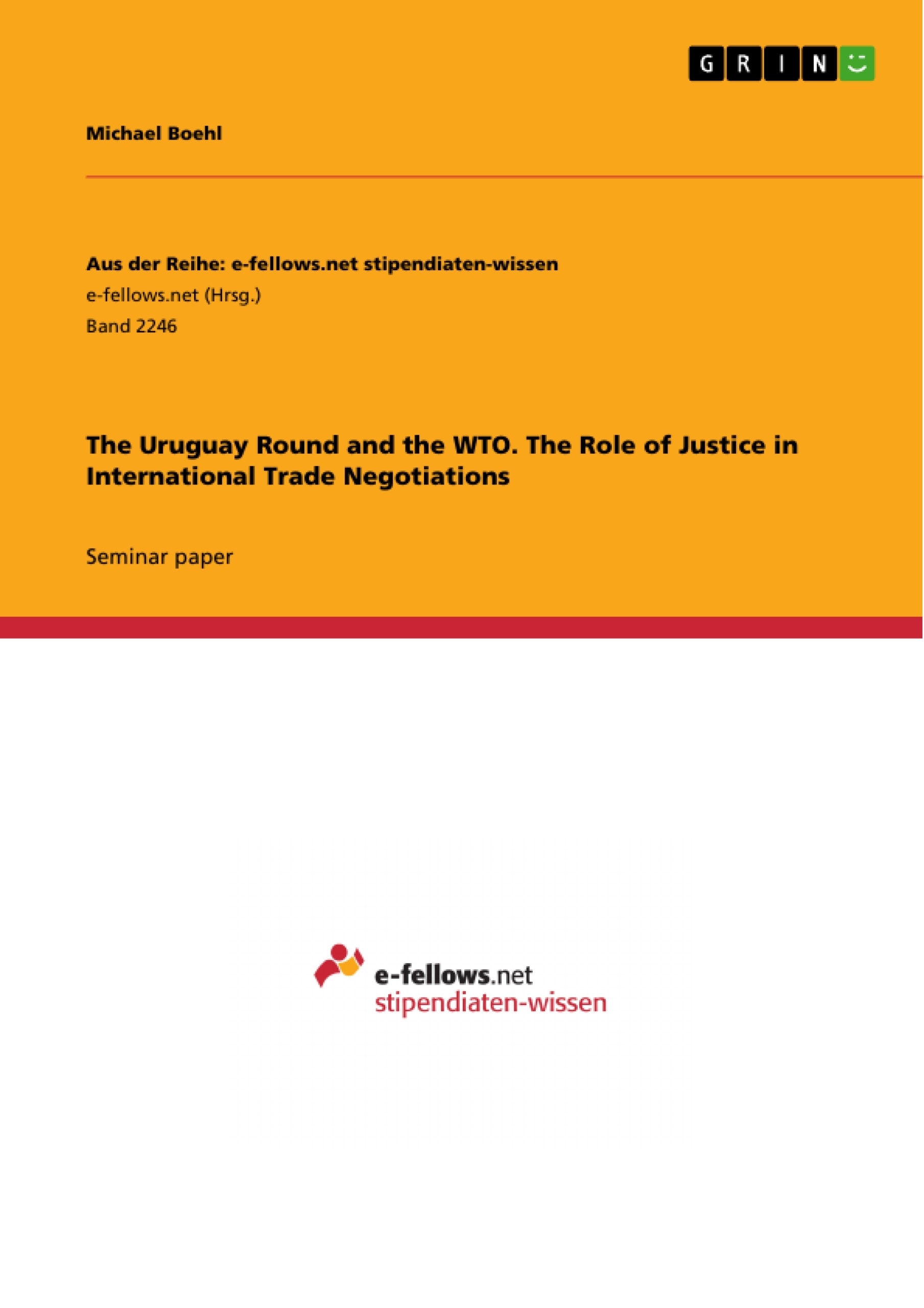This essay’s general interest is in whether international trade institutions comply with a sense of justice. Concretely speaking, it is to be analysed whether the outcome of a specific international trade negotiation, namely the Uruguay Round, which lasted from 1983 to 1994, is to be judged as “just” or “unjust”. Fulfilling this task, this essay at first displays a concept to define the very abstract term of justice. The regarded definition will be mainly according to Cecilia Albin.
The second part of this essay provides a summary of main features of the Uruguay Round’s final act, the Agreement on Agriculture (AoA) and the Agreement on Trade-Related Aspects of Intellectual Property Rights (TRIPS). Although other sections of the agreement are highly interesting, too, these two fields prove to be extraordinarily useful for this paper’s purpose. Nevertheless it is the my intention to point on other issues of interest for instance labour standards or the further development since 1994 in this essay where it seems helpful and possible. The chapter summarizing the Uruguay Round’s outcome is mainly based on World Trade Organisation (WTO) sources, to insure that no subliminal judgement is included or at least none already supporting the view of the later discussed criticism.
The third section analyses the Uruguay Round’s outcome concerning agriculture and intellectual property. The criticism is derived from economic authors like Dasgupta and Sander/Inotai and development orientated NGOs like OXFAM as well. In most cases the analysis is critical of the agreement, at the same time avoiding the word “justice”. This gap shall be filled by the author’s assessment of the criticism, judging it, and linking it explicitly to the question of justice.
At the end of the essay I want to draw a conclusion about justice in the Uruguay Round agreement, also taking into consideration recent developments within the agreement of the WTO, and referring to the question raised at the beginning of this introduction about ethics and morality in IR.
Inhaltsverzeichnis (Table of Contents)
- Introduction
- Main Body
- Concepts of Justice in International Negotiations
- Selected Aspects of the Uruguay Round Agreement
- Critical Analysis of the Uruguay Round Agreement
- Conclusion
Zielsetzung und Themenschwerpunkte (Objectives and Key Themes)
This essay examines the justice of the Uruguay Round trade negotiations. It analyzes whether the outcome of the negotiations aligns with a sense of justice, specifically focusing on the Agreement on Agriculture (AOA) and the Agreement on Trade-Related Aspects of Intellectual Property Rights (TRIPS).
- Defining justice in international negotiations
- Analyzing the key features of the Uruguay Round agreements
- Assessing the agreements from a justice perspective
- Exploring the role of ethics and morality in international relations
- Examining the implications of the agreements for developing countries
Zusammenfassung der Kapitel (Chapter Summaries)
The introduction establishes the essay's purpose and outlines its approach to assessing justice in the Uruguay Round negotiations.
The main body chapter explores different concepts of justice, particularly focusing on Cecilia Albin's definition of fairness in international negotiations. This section examines various principles of justice including the most-favored-nation (MFN) principle, national treatment, mutual advantage, and John Rawls' "justice as fairness."
The chapter on the Uruguay Round Agreement provides a summary of key features of the agreements, particularly focusing on the Agreement on Agriculture (AOA) and the Agreement on Trade-Related Aspects of Intellectual Property Rights (TRIPS). The chapter also briefly mentions other aspects of the agreement, including labor standards.
Schlüsselwörter (Keywords)
The key terms and concepts explored in this essay include justice, fairness, international negotiations, Uruguay Round, Agreement on Agriculture (AOA), Agreement on Trade-Related Aspects of Intellectual Property Rights (TRIPS), most-favored-nation (MFN) principle, national treatment, mutual advantage, John Rawls' "justice as fairness", and the role of ethics and morality in international relations.
- Quote paper
- Michael Boehl (Author), 2005, The Uruguay Round and the WTO. The Role of Justice in International Trade Negotiations, Munich, GRIN Verlag, https://www.grin.com/document/352638




